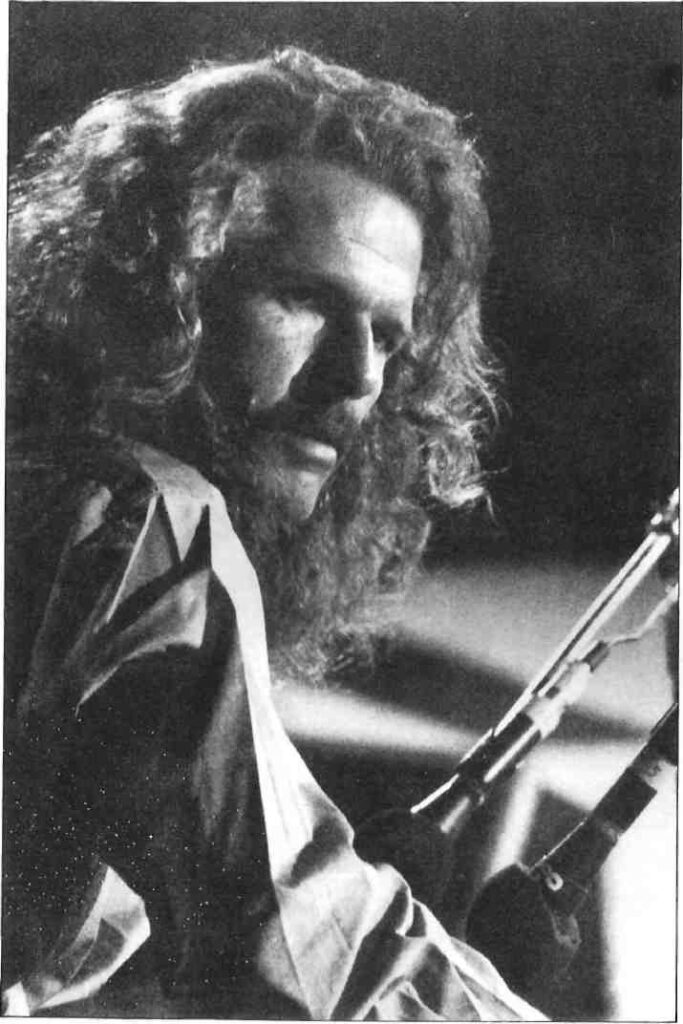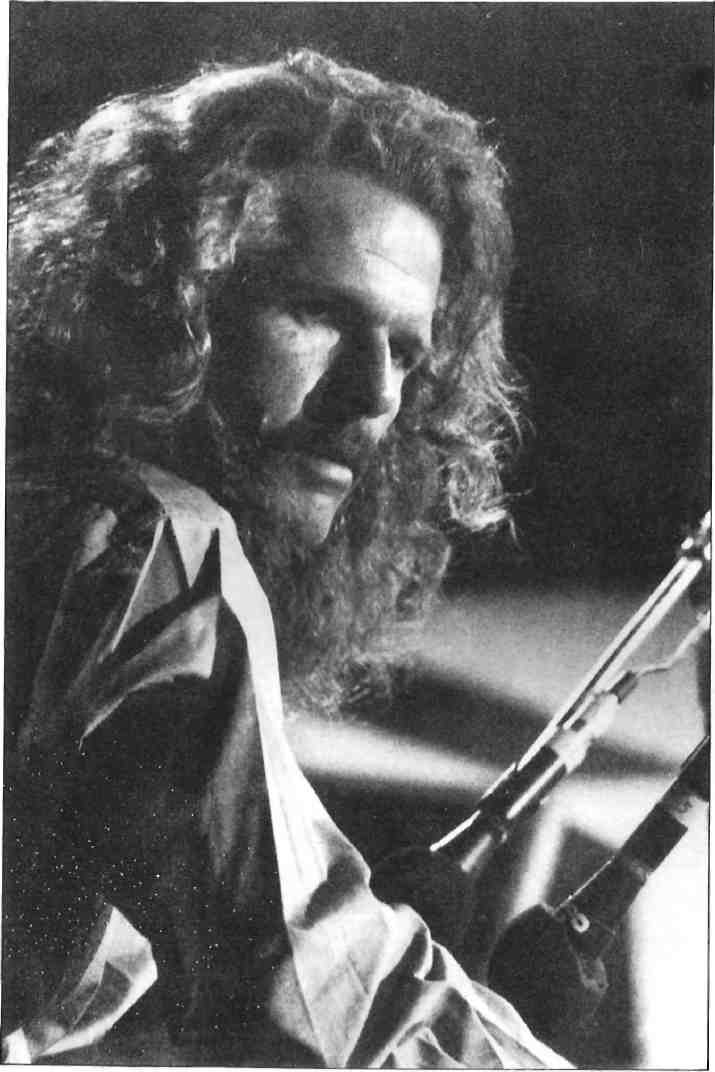Those who have had the good fortune to hear Ross Daly and his group, Lavyrinthos (Labyrinth), live, or on records may have asked themselves: how is it that an Irishman has become one of the most dynamic interpreters of ‘traditional’ music in Greece?

Although Daly’s musical education began with classical guitar training, he decided, while still at school, that his real interest lay in the folk and classical music of the Middle East. His globetrotting also began early. His childhood years were spent in England, Canada and Japan. Since then, he has lived and studied in Iran, Turkey and Greece researching the music of these countries, learning to play an array of instruments and, along the way, acquiring fluent French, Turkish and Greek.
Daly was first drawn to Greece by the music of Crete. Now, after 13 years of being based in Hania, Daly is spending more time ‘away from home’, in Athens and on Cyprus. While on Crete, he studied all facets of the island’s music and mastered the Cretan lyra under the tutorship of the contemporary master of the instrument, Kostas Moundakis. Nowadays, Daly is widely regarded as being himself a foremost lyra player and is much sought after for festivities on the island. He has an encyclopedic knowledge of traditional Cretan dance melodies – his perfomances are peppered with quotations from these songs – and has composed a number of his own which have found their place in the repertoires of other Cretan groups.
When performing he will sometimes play this Cretan music “straight” but, more frequently, he will contribute something of his own: a song will be played in an unusual tempo, for instance, or the melodic line will be played on a politiki (Constantinopolitan) lyra instead of a Cretan one. These instruments resemble one another but sound quite different. Says Daly, ” The Cretan lyra is used for dance music, and imitates older Cretan instruments – bagpipes, for instance or flutes. The kemenge -the Persian term for the politiki lyra – is used exclusively for Ottoman classical music.'”
On the album, Ross Daly, there is an extended composition which, while immediately recognizable as being inspired by Cretan music, contains much that is usually associated with Turkish music.
It is this breaking down of barriers between different types of material that is the main purpose of Lavyrinthos. For all Daly’s love of Cretan music, his interests and those of the group are not confined to any single area. Lavyrinthos encompasses the music of all the Middle East, from Northern India to Greece. In this vast territory there is a musical heritage which, though it has evolved in different ways from place to place, does share common elements. It is not unknown, for example, for an Arab melody to turn up as a Cretan folk song. One aspect of the work of Lavyrinthos is to research and perform the folk and classical music of this area. Another aim of these musicians is to explore the ways in which the different features of this musical family can be combined in new ways. So, a Pontic melody will merge with a Cretan one, perhaps with a percussive accompaniment in an Arabic style.
However, when traditional material is used, it is always treated with respect: neither the intricacies of many traditional melodies nor the complexities of rhythmical structure are simplified.
As well as orchestrating traditional pieces the group has produced a number of original compositions. Daly himself tends to underplay the importance of these pieces, and doesn’t like to use the word composition in this respect: he feels that this material is a development of traditional material, so that the notion of “originality” isn’t really appropriate in the sense in which it is usually applied to Western music.
Nevertheless, these variations are some of the group’s most fascinating pieces, perhaps because they provide the greatest flexibility for the musicians who contribute to them. Two excellent examples are the haunting Aftoschediasmos (“Improvisation”) on Ross Daly and “The Dream of Iocasta” on Anadyse: in this second piece in particular there is an enormous range of style and instrumentation (including the clarinet, the double bass and the sitar) that is unique.
It was during many years of study and gathering material in Greece that Lavyrinthos gradually took shape. The makeup of the group reflects the wide scope of the music: there are musicians from Greece, Turkey, Armenia, England, and the US. The members became involved in the Lavyrinthos project gradually, often as a result of chance meetings; many are musicians taught in the traditional way rather than being college trained, and the latest member is a chemist from Hania, Spyridoula Toutoudaki, who occasionally sings with the band. All are accomplished performers in their own right. When necessary, other players with well-established careers of their own, such as the clarinetist, Vassilis Soukas, contribute to individual performances or recordings.
As the logistics of organizing such a large group are formidable, concerts in which everyone associated with Lavyrinthos takes part are not everyday affairs. However, Daly frequently gets together with a few individual members to perform live. They prefer small gigs where electric amplification isn’t necessary, and an excellent venue they have played recently is Ravanastron in Ambelokipi. At these performances it is very common for the group to be joined by any other musicians who happen to be around, so that the set is being continually developed and changed. In these informal surroundings they have the time and freedom to explore the progress of the gig: sometimes the accent is on the meditative pieces, at other times on livelier dance tunes. (Dancing is very much encouraged at their performances). When the atmosphere is right the musicians play for hours. They are an attractive group to watch; it is absorbing just to look at the instruments, which are excellent examples of their types from many countries, often used in the most unexpected musical contexts. That Lavyrinthos is creating a favorable climate for traditional music in Greece is shown by the remarkable response evoked by the appearance last year of the Turkish orchestra, Vosporos, and by the saz player Talip Ozkan, as well as by Lavyrinthos’ own television appearances.
The albums to date are Ross Daly and Anadyse. These are widely available in Athens, but if in difficulty try Pop Eleven on Pindarou, Kolonaki, or the Xylouris record shop at Panepistimiou 31. Check newspapers and Athinorama for gigs: however, as these are often spontaneous affairs, it is also worth phoning likely venues to inquire if anything is happening that evening. Ravanastron (Dimitsana 60, Ambelokipi, 644-9534) is definitely worth a call as they try to offer live traditional music every night. The group also performs regularly at Theatre Kava on Stadiou St under the auspices of the Center for Expression.








